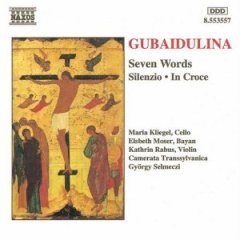Gubaidulina - Seven Words - Silenzio - In Croce (1996)
Gubaidulina - Seven Words - Silenzio - In Croce (1996)

1. In croce, for cello & organ (or bayan) 2. Silenzio, pieces (5) for bayan, violin & cello: I. 3. Silenzio, pieces (5) for bayan, violin & cello: II. 4. Silenzio, pieces (5) for bayan, violin & cello: III. 5. Silenzio, pieces (5) for bayan, violin & cello: IV. 6. Silenzio, pieces (5) for bayan, violin & cello: V. 7. The Seven Last Words, for cello, bayan & strings: Vater, vergib ihnen, denn sie wissen nicht, was sie tun 8. The Seven Last Words, for cello, bayan & strings: Weib, siehe, das ist dein Sohn. - Siehe, das ist deine Mutter. 9. The Seven Last Words, for cello, bayan & strings: Wahrlich, ich sage dir: Heute wirst du mit mir im Paradiese sein 10. The Seven Last Words, for cello, bayan & strings: Mein Gott, mein Gott, warum hast du mich varlassen? 11. The Seven Last Words, for cello, bayan & strings: Is ist vollbracht 12. The Seven Last Words, for cello, bayan & strings: Vater, ich befehle meinen Geist in deine Hände Maria Kliegel – cello Elsbeth Moser – bayan Kathrin Labus – violin Camerata Transsylvanica Gyorgy Selmeczi – conductor
This disc contains three works by Russian-Tatar composer Sofia Gubaidulina, an artist of deep religious sentiment as is apparent in these titles: "In croce", "Silenzio", and "Sieben Worte". The common instruments in these works are the cello and the bayan. The latter is a type of Russian accordian played here by Elsbeth Moser, who performed in the Western premier of "Sieben Worte" and to whom Gubaidulina dedicated "Silenzio." Cello is played by Maria Kliegel, who has performed under the approval of Rostropovich.
"In Croce" was originally written in 1979 as a piece for organ and cello, but it is represented here in a 1991 arrangement for cello and bayan by Elsbeth Moser which Gubaidulina has approved. It is an exploration of "vertical" music (the organ or bayan) intersected by the "horizontal" (cello), thus forming the cruciform symbolism so common in Gubaidulina's work. Personally, I prefer the performance of the cello and organ version by Ivashkin and Hicks released by Chandos, for the organ just seems to work better than the bayan. Still, Kliegel's cello work here is deeply moving and worth hearing, less restrained than Ivashkin's but perhaps more passionately religious.
"Silenzio" is a fragile, insubstantial piece for bayan, violin, and cello in which the vast majority of the work is played pianissimo. It consists of five "miniatures" which all maintain the same rhythmic proportion 7-2-5 in varying ways. It is an interesting experiment, but it results in the least interesting item on this disc, and it's technical brilliance comes at the expense of religious power.
"Sieben Worte (Seven Words)" for cello, bayan, and strings, is a crucial piece in this disc, and in Gubaidulina's oeuvre in general. I have said before that the composer's "Johannes-Passion" may be the greatest work of Christian piety of our time, but "Sieben Worte" follows not very long behind. It is an acknowledgement of the tradition of religious composition, and contains quotations from Heinrich Schuetz and clear influence from Haydn. Nonetheless, the bulk of the piece shows the originality of Gubaidulina through and through and has an elaborate technical basis on the cello which is too long to quote here, but which is included in the liner notes. The strings of the Camerata Transsylvanica (ironically based in Budapest after the emigration of its members) under Gyorgy Selmeczi are intense and unfaltering.
As is unfortunately usual with Naxos discs, the weak point is the liner notes. The English and German are, inexplicably, two different commentaries instead of a common text translated from one or the other. Keith Anderson's English commentary is quite interesting but poorly edited and unprofessional. Teresa Pieschacon Raphael's German commentary tells something about Gubaidulina's place in the Soviet music community which English readers too should have been able to enjoy. Though Naxos was kind enough to provide commentaries in two languages, the profile of the performers is only in English.
These three pieces, especially the last, make an excellent introduction to the work of this superlative composer, and at an economic price. This is one of the finest works in my collection, and I sincerely and passionately recommend it to just about anyone. ---Christopher Culver
Last Updated (Tuesday, 21 July 2015 13:49)








